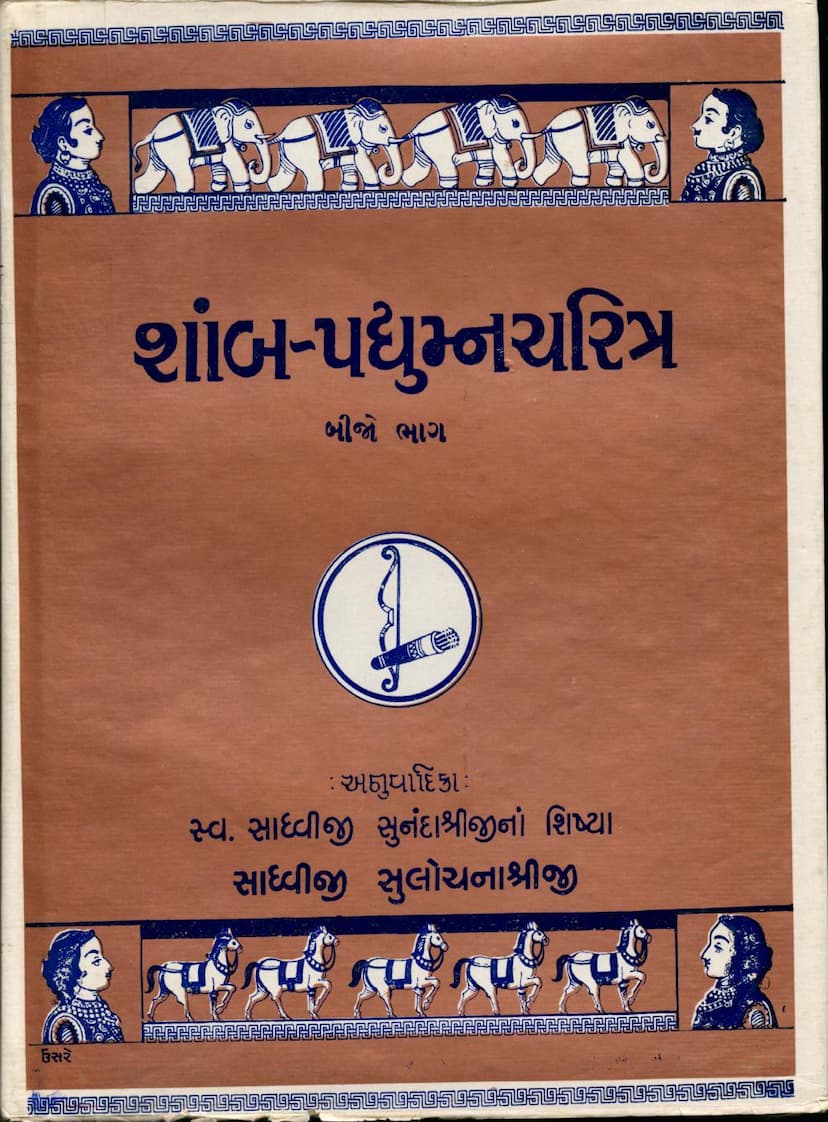Shamb Pradyumna Charitra Part 02
Added to library: September 2, 2025

Summary
Here's a comprehensive summary of the Jain text "Shamb Pradyumna Charitra Part 02" by Sadhvi Sulochana Shreeji, based on the provided pages:
Title: Shamb Pradyumna Charitra Part 02 Author: Sadhvi Sulochana Shreeji (Disciple of the late Pravartini Sadhvi Sunanda Shreeji) Publisher: Amitbhai S Mehta Original Author of the Sanskrit Text: Kavi Chakravarti Shri Ravishankar Ganivira
Overview:
"Shamb Pradyumna Charitra Part 02" is the second volume of a Jain narrative text, originally authored in Sanskrit by Shri Ravishankar Ganivira and translated into Gujarati by Sadhvi Sulochana Shreeji. This volume covers chapters 9 to 16, continuing the epic story of Shamb and Pradyumna. The text aims to bring these ancient Jain narratives, written in Sanskrit which is no longer a common language, into a more accessible Gujarati translation for a wider audience. The publisher, Amitbhai S Mehta, expresses gratitude to financial contributors who made the publication possible, particularly highlighting the inspiration of Sadhvi Shri Sulochana Shreeji.
Content Summary (Chapters 9-16):
The provided text details significant events in the lives of Pradyumna and his lineage, focusing on their heroic deeds, spiritual growth, and encounters with supernatural beings.
-
Pradyumna's Childhood and Rise to Power (Chapter 9 onwards): The text describes Pradyumna's divine birth and exceptionally attractive form from childhood. His prowess in warfare and arts is highlighted. He conquures various Vidyadhar kings and their kingdoms, demonstrating his strength and skill in battle. Upon his victorious return, he is welcomed with great celebration by his father, King Kalasanvara, who then bestows upon him the title of Yuvaraj (crown prince). Despite his immense power and wealth, Pradyumna remains virtuous and free from corrupting influences, earning him the title "Manobhava" (one who controls desires).
-
Encounter with the Vidyadhar Princes' Conspiracy: Pradyumna's father, King Kalasanvara, had five hundred queens, who bore him five hundred sons. These princes, influenced by their ambitious mothers, conspire against Pradyumna. They attempt to poison him through food and drink, but his past merits protect him, turning the poison into nectar. Overcome with jealousy at his growing fame and prosperity, they become increasingly enraged.
-
Adventures and Trials: The narrative then describes Pradyumna's encounters with various supernatural beings and magical challenges. He faces formidable opponents like Vajradanshtra and other Vidyadhar princes, who are defeated through his divine powers and astute strategies. These trials often involve entering magical palaces, overcoming treacherous terrains, and interacting with guardian deities (Asuras, Nagakumars, Yakshas).
- Confrontation with Nagakuma Devata: Pradyumna enters a magnificent palace guarded by a Nagakuma devata who is initially enraged by his intrusion. Pradyumna subdues the devata with his strength, earning him respect and valuable boons, including magical powers and divine artifacts.
- Meeting Vidyadhar Kings and Acquiring Knowledge: He continues his adventures, encountering and defeating other rulers, including those possessing powerful mantras and magical abilities. He is described as acquiring various divine weapons and knowledge.
- Encounter with Hiranya and Renunciation: A significant episode involves Hiranya, a Vidyadhar king who, after ruling justly, renounces his kingdom to pursue spiritual enlightenment. He attains Kevala Jnana (omniscience) and achieves liberation. His story highlights the Jain path of renunciation and spiritual attainment.
- The Story of Rati and the Encounter with Neminath: Pradyumna encounters a beautiful maiden named Rati, who is the daughter of King Prabhanjana. It is foretold that Rati will marry Pradyumna. He meets her in a divine garden while she is meditating. The text describes the divine chariot, celestial music, and the eventual union, emphasizing the importance of destiny and the spiritual significance of their meeting. He also receives blessings and guidance from Lord Neminath.
- The Conflict with Shakuni and Karna: The narrative also touches upon the lineage of the Kauravas and Pandavas, mentioning Duryodhana's pride and his conflict with the Pandavas. The story of Karna, the son of Kunti, is also alluded to, highlighting the complexities of dharma, fate, and human relationships.
- The Trial of Pradyumna's Mother (Kanakmala): An extensive part of the text describes the downfall of Pradyumna's own mother, Kanakmala. Driven by lust and consumed by desire for her own son, she attempts to seduce him. Pradyumna, with his divine wisdom and adherence to dharma, rejects her advances, leading her to despair and self-inflicted torment. This narrative serves as a cautionary tale about the destructive power of uncontrolled desires.
- Pradyumna's Return to Dwaraka and Family Reunion: After his extensive travels and trials, Pradyumna, adorned with his victories and divine gifts, returns to his father's kingdom. He is welcomed with great pomp and ceremony. He also reunites with his mother, who is overcome with emotion.
Key Themes:
- Prowess and Heroism: The text celebrates the extraordinary strength, courage, and skill of Pradyumna and his predecessors.
- Dharma and Virtue: Despite facing temptations and powerful adversaries, the protagonists consistently uphold dharma and righteousness.
- Divine Intervention and Destiny: The narrative suggests that divine powers and past karmas play a significant role in the unfolding of events.
- The Path to Liberation: The story of Hiranya illustrates the Jain ideal of renunciation and the pursuit of spiritual liberation.
- Cautionary Tales: The episode of Kanakmala's downfall serves as a moral lesson against lust and uncontrolled desires.
- Family and Relationships: The text explores the complexities of family dynamics, including parental love, loyalty, and the consequences of negative emotions like jealousy and hatred.
Overall Purpose:
The "Shamb Pradyumna Charitra" aims to inspire readers with tales of virtue, heroism, and spiritual wisdom, emphasizing the importance of adhering to Jain principles even in the face of immense challenges and temptations. The translation into Gujarati makes these ancient teachings accessible to a broader audience, promoting Jain education and values.